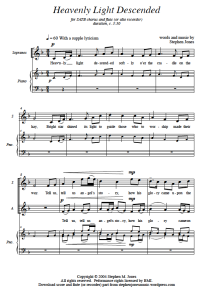I rarely use this blog. If something doesn’t work, please know it’s definitely an “under construction” site.
Heavenly Light Descended – free download
A Christmas carol for SATB chorus and flute (or alto recorder)
I wrote this Christmas carol in 2004. It’s been sung a couple of times but I haven’t ever done anything to promote it. So, rather than have it sit in the drawer, I thought I ought to make it available. Here are the score and parts, available for free download. While you can print it back to back on 8.5 x 11, it will look a bit odd because it’s formatted to be printed like traditional choral music. To get the intended result, print it booklet style on 11×17 sheets with saddle stitch staples (optional), then cut to size: 6.75 in. wide by 10.5 in. high.
If you perform the piece, please let me know. Merry Christmas!
At the Center of Clarity
Earlier this year I had a great experience writing a short new piece for a concert celebrating the 60th Anniversary of the Beijing Dance Academy. Choreographed by Ihsan Rustem, it was danced by Logan McGill and Savannah Thompson, two BYU undergraduates. The piece is for flute, cello and piano.
Why The Arts Are Necessary, And What They Teach
By Stephen Jones
Dean, College of Fine Arts and Communications
Brigham Young University
January 13, 2011
Adapted from a talk given at the 2011 CITES conference in St. George, Utah
I believe CITES exists to provide leadership in education. Our efforts to improve curriculum and pedagogy should learn from as well as guide and inspire other educators throughout the world. To do so, we need a true understanding of the needs of children in our present society and culture and must help equip them for the roles they will play in a world in which the pressures and influences of globalization and technological innovation are producing unparalleled changes in our lives, relationships and work.
Given this context, the long-held aim of the McKay School of Education to prepare teachers who to help students develop character through the use of their agency toward moral ends has never been more important. It is imperative that we achieve this goal, and the arts play a vital role in doing so.
The arts foster unique ways of knowing that help students develop unique ways of being: being creative, being able to express themselves, being able to collaborate, being confident, being genuine, being sensitive, being able to listen, and to develop both skill and judgment.
I am concerned that the majority of children are not participators as much as spectators, not creators as much as consumers. They live in electronic worlds filled with terse, clipped communications that limit their ability to express themselves and to be effective in social settings. They are bombarded with invitations to surf endless channels, view vast stores of mindless video, and share trivia with social media friends. In these activities children are influenced by role models and paradigms that often do not represent true ways of being. This focus on consumption prevents them from acquiring rigor and determination required for their personal development.
In this context, I believe instruction in the arts is vital and necessary for at least the following reasons:
The Arts Provide Unique and Authentic Ways of Learning and Retaining Knowledge
I believe the arts complement intellectual learning with kinesthetic, aural and visual knowledge, engaging the muscles and movements of students’ bodies to express and master concepts that cannot be understood by the mind alone. The arts help them learn things “by heart,” and in the process they develop both the heart and the mind.
The Arts Develop Personal Identity Through Self Expression
I believe the arts help students develop the power of personal expression. They increase students’ capacity to explore and know themselves in the presence of others, which provides identity, self awareness, and personal conviction and is an antidote to the loss of identity they can so easily suffer in a world in which they are overwhelmed by messages yet starved of real communication.
The Arts Develop Judgment and Wisdom Through Vicarious Experiences Involving Agency and its Consequences
I believe the arts have the power to develop students’ judgment and wisdom by experiencing the consequences of their agency. For example, through involvement with theater they can vicariously come to know the consequences of adversity, ideological differences, poor decisions, etc., and can learn to overcome such challenges through perseverance, forgiveness and charity, hope and integrity.
The Arts Foster Personal and Community Renewal
I believe the arts provide opportunities for students to be renewed and to reorganize themselves in a world that is in a constant state of disorder. They engage students’ energies in transforming what could be a mundane or even hopeless world into a place of beauty and possibility by using their talents toward the development and realization of their personal creative visions.
The Arts Encourage Creativity and Collaboration
In singular and uniquely powerful ways, the arts teach students to work together, helping them learn how individual efforts harmonize into communities of action and giving them experiences and confidence they will need to interact with others as contributing members of society. The arts provide students meaningful and authentic ways to develop the skills of creativity, collaboration and communication outlined in the Framework for 21st Century Learning (www.p21.org).
There are many other reasons to teach the arts. They are indispensable in educating the whole child and play an integral role in achieving the educational leadership position we must provide. In short, they bring our students and us to an awareness of what it means to be human. They affirm our being, and we must affirm their role in education.

